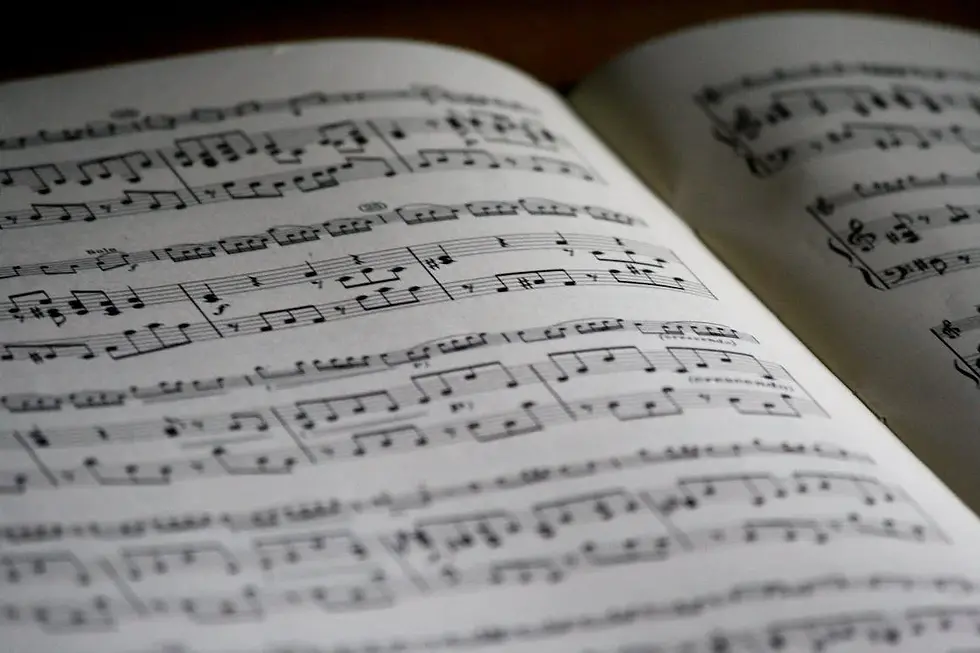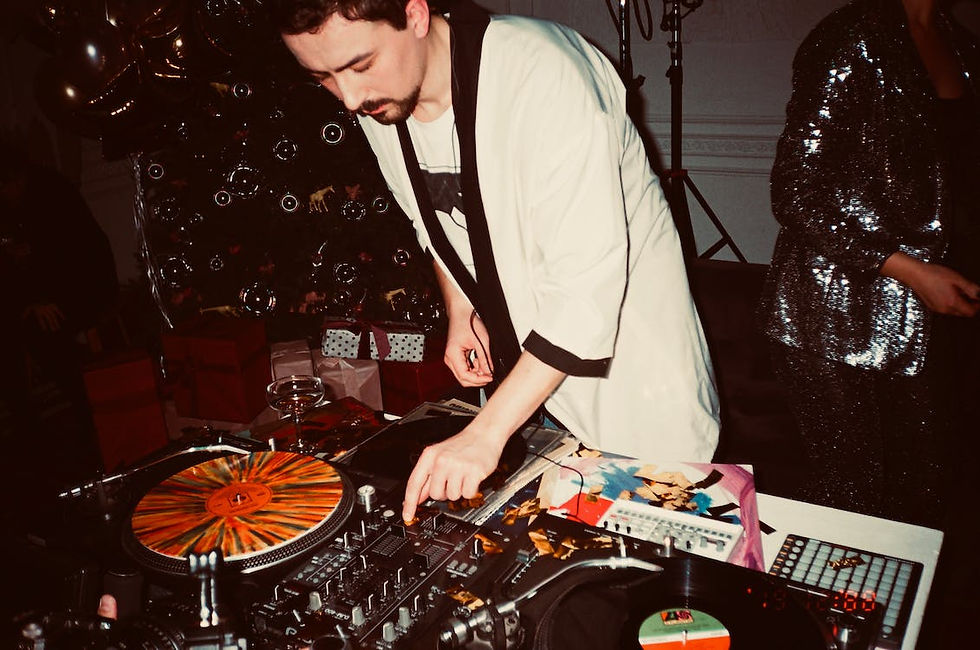The Influence of Music on Culture and Society.
- The Moolah Team
- May 1, 2023
- 8 min read
In this blog post, we will explore the impact of music on culture and society.
From protest songs to the role of music in social movements, we will look at how music has been used to express social and political messages and how it has influenced popular culture.
I. Introduction: The Influence of Music on Culture and Society
Music has been an integral part of human expression and culture for thousands of years. From ancient times to the present day, music has played a significant role in shaping our social and political beliefs, fashion and style choices, and even our technology. The impact of music on culture and society is undeniable, and in this blog post, we will explore the different ways in which music has influenced our lives.
In this post, we will delve into the historical context of music as a form of expression and how it has evolved over time. We will also discuss the social and political messages in music, highlighting the impact of protest songs on social movements. Additionally, we will examine the role of music in popular culture, including how it has influenced fashion and style, and its impact on film and television.
Furthermore, we will explore the relationship between music and technology, discussing how music technology has evolved over time and its impact on music production and distribution. We will also examine the influence of technology on music consumption, including the pros and cons of the digital music age.
In the following sections, we will provide a detailed analysis of each of these aspects, examining the influence of music on culture and society in depth. Through this blog post, we hope to demonstrate the significance of music as a powerful and transformative force that has the ability to shape our world and the way we perceive it.
In summary, music has been a critical element in human expression and culture for thousands of years. It has played a significant role in shaping our social and political beliefs, fashion and style choices, and even our technology. In this blog post, we will explore the different ways in which music has influenced our lives, highlighting its impact on culture and society.

II. Music as a Form of Expression Throughout History
Music has been an integral part of human expression since ancient times. From religious ceremonies to courtly entertainment, music has been used to communicate emotions and ideas, to bring people together, and to express identity and culture. Over the centuries, music has evolved alongside human society, reflecting changing attitudes, beliefs, and technological advancements.
In ancient civilizations such as Greece, Rome, and Egypt, music played a crucial role in religious and social rituals. For example, in ancient Greece, music was used to worship the gods, to entertain at social gatherings, and as a means of political propaganda. In Rome, music was a vital part of public performances, including gladiatorial games and theatrical productions.
During the Middle Ages, music continued to be used in religious contexts, with Gregorian chant and polyphony becoming popular forms of musical expression. The Renaissance period saw the emergence of instrumental music and the rise of the composer as a distinct artistic figure. Music in the Baroque period was characterized by ornate melodies and complex harmonies, while the Classical period focused on simplicity and clarity of form.
In the 20th century, music became increasingly diverse and experimental, with new genres such as jazz, blues, rock, and hip-hop emerging. These musical styles reflected changing social and political attitudes, and often served as a platform for protest and social commentary.
Overall, music has evolved alongside human society and has been used as a means of expression, identity, and communication throughout history. Whether used in religious or secular contexts, music has the power to bring people together and to shape our collective consciousness.

III. The Power of Protest Songs
Throughout history, music has played a significant role in social and political movements, particularly through the power of protest songs. These songs have been used to express dissatisfaction with the status quo, to call for change, and to inspire social and political action.
One of the earliest examples of protest songs can be traced back to the 19th century with songs that were sung by slaves to express their resistance to slavery. During the Civil Rights movement of the 1950s and 1960s, protest songs such as “We Shall Overcome” and “A Change Is Gonna Come” became anthems for the movement, inspiring people to fight for their rights and to bring about change.
Similarly, during the Vietnam War, protest songs such as “Fortunate Son” by Creedence Clearwater Revival and “Ohio” by Crosby, Stills, Nash, and Young, became powerful tools for anti-war activists, expressing their opposition to the war and the government policies that supported it.
More recently, protest songs have continued to play a significant role in social and political movements, with artists such as Beyoncé, Kendrick Lamar, and Childish Gambino using their music to express their views on issues such as police brutality, racism, and inequality.
The power of protest songs lies in their ability to connect with people emotionally and to inspire action. Through their lyrics and melodies, protest songs can convey complex ideas and emotions, making them accessible to a wider audience. Furthermore, the ubiquity of music in popular culture means that protest songs can reach a broader audience than traditional forms of activism, such as protests or rallies.
In conclusion, protest songs have been an essential element of social and political movements throughout history. Their ability to inspire, connect with people emotionally, and to convey complex ideas and emotions, has made them a powerful tool for social change. Through protest songs, artists have been able to express their dissatisfaction with the status quo, call for change, and inspire social and political action.

IV. Music and Popular Culture
Music has played a significant role in shaping popular culture. From the emergence of rock and roll in the 1950s to the rise of hip hop in the 1980s, music has influenced fashion, language, and attitudes.
One of the most significant ways in which music has influenced popular culture is through fashion. For example, during the 1960s, the Beatles and the Rolling Stones popularized a new style of clothing that was characterized by tight-fitting pants, bright colours, and bold patterns. Similarly, during the 1980s, hip hop artists such as Run-DMC popularized the wearing of Adidas tracksuits and sneakers, which became synonymous with the genre.
Music has also played a significant role in shaping language and attitudes. For example, the rise of hip hop in the 1980s saw the emergence of new slang terms and expressions that were adopted by young people across the country. Similarly, during the 1960s, the protest songs of Bob Dylan and Joan Baez influenced a generation of young people and helped to shape their political attitudes.
In addition to shaping popular culture, music has also been influenced by it. For example, the rise of the internet and social media has had a significant impact on the music industry, changing the way in which music is produced, distributed, and consumed. The emergence of streaming services such as Spotify and Apple Music has made it easier than ever for people to access music from a variety of artists and genres, while social media platforms such as TikTok have helped to popularize new songs and artists.
Furthermore, music has become an essential element of advertising and marketing, with many companies using popular songs and artists to sell their products. For example, Apple's use of the song "1234" by Feist in their iPod commercials helped to propel the song and the artist to mainstream success.
In conclusion, music has played a significant role in shaping popular culture, influencing fashion, language, and attitudes. At the same time, popular culture has also influenced music, changing the way in which music is produced, distributed, and consumed. As music continues to evolve and adapt to new technologies and cultural trends, it will remain an essential element of popular culture and society.

V. The Future of Music and Its Impact on Culture and Society
As we move into the future, music will continue to play a significant role in shaping culture and society. One of the most significant ways in which music is likely to influence culture is through its use in virtual and augmented reality experiences.
Virtual and augmented reality experiences have the potential to transform the way in which we experience music, allowing us to immerse ourselves in virtual environments that respond to our movements and actions. For example, virtual concerts and music festivals have already begun to emerge, allowing people to experience live music in a virtual space without leaving their homes.
At the same time, the rise of artificial intelligence and machine learning is likely to have a significant impact on the way in which music is produced and consumed. For example, AI algorithms are already being used to create new songs and compositions, with companies such as Amper Music and Jukedeck offering AI-generated music for use in films, games, and other media.
Furthermore, the emergence of blockchain technology has the potential to transform the way in which music is distributed and monetized. Blockchain technology can be used to create decentralized platforms that allow artists to sell their music directly to their fans without the need for intermediaries such as record labels or streaming services. This has the potential to create a more equitable system in which artists receive a greater share of the revenue generated by their music.
However, there are also concerns that these new technologies may have negative impacts on the music industry and the broader culture. For example, the rise of streaming services has led to concerns about the devaluation of music, with some artists claiming that they receive very little revenue from streaming platforms.
Similarly, the use of AI-generated music has raised concerns about the role of human creativity and the potential for a loss of artistic integrity. Critics argue that AI-generated music lacks the emotional depth and complexity of music created by human composers and musicians.
In conclusion, the future of music is likely to be shaped by new technologies such as virtual and augmented reality, artificial intelligence, and blockchain. While these technologies have the potential to transform the way in which we experience, create, and distribute music, they also raise concerns about the impact on the music industry and the broader culture. As music continues to evolve, it will be important to ensure that these new technologies are used in ways that support and enhance the creativity and cultural significance of music.

VI. Conclusion
In conclusion, music has always been an integral part of human culture and society. From ancient times to the modern era, music has been used to express emotions, communicate ideas, and bring people together.
Music has played a crucial role in shaping culture and society, influencing fashion, language, and attitudes. Music has been used to inspire social and political change, with protest songs serving as a powerful tool for promoting activism and challenging injustice.
Moreover, music has the power to bring people together across cultural and social divides. It has the ability to transcend language barriers and communicate emotions and ideas in a way that words alone cannot.
As we have explored in this blog post, music has had a profound impact on culture and society, from its influence on fashion to its role in social movements. Music has the ability to shape our understanding of the world around us and to inspire us to think and act differently.
As we move into the future, music is likely to continue to play a crucial role in shaping culture and society. New technologies such as virtual and augmented reality, artificial intelligence, and blockchain will have a significant impact on the way in which we create, consume, and distribute music.
Despite these technological advancements, the power of music to inspire and connect people remains unchanged. As we navigate the challenges and opportunities of the future, it is important to remember the cultural and social significance of music and to ensure that it continues to be valued and celebrated for generations to come.
In conclusion, music is not just a form of entertainment or a commercial product. It is a fundamental part of human culture and society, with the power to bring people together, inspire change, and shape the world around us.
Thanks for reading our blog post on the influence of music on culture and society. We hope that this post has provided you with a deeper understanding of the ways in which music has shaped and influenced our world.
If you enjoyed this post, please consider subscribing to our newsletter to stay up to date with our latest content. We appreciate your support and look forward to sharing more insights with you in the future.
Thanks a million,
Moolah.






Comments